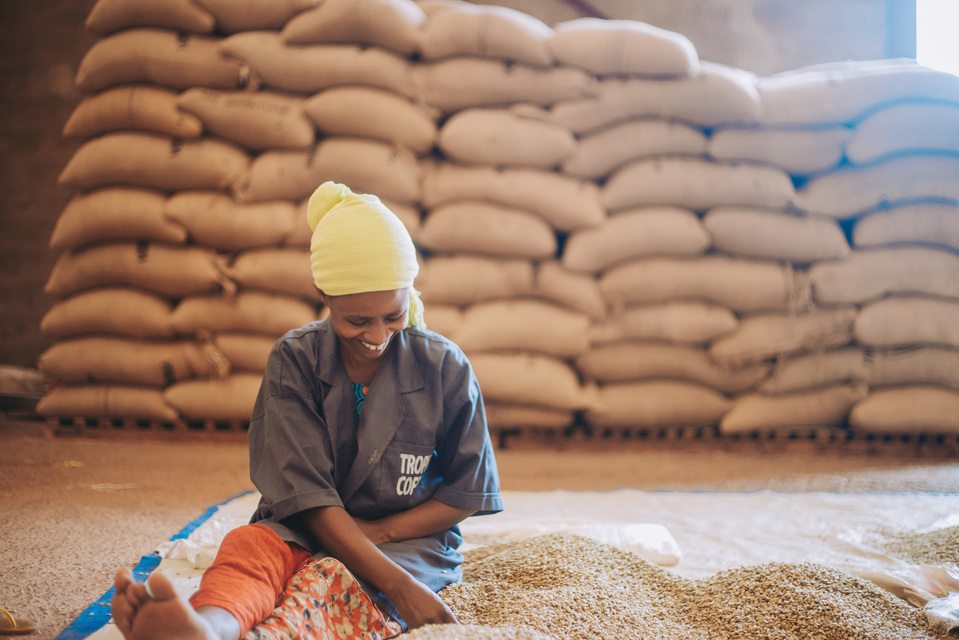January 2022
Feature #39
Excited to have Excelso Coffee Roasters back as our first collaboration of 2022.
We first collaborated with Excelso Coffee Roasters for our December 2020 feature, featuring a lot from Brazil. We got back in touch with Josie and the team for our 2021 Coffee Advent Calendar, to which they offered us this coffee. It wowed us enough that we just needed to share it with our subscribers and tell the story in more detail.
Our January feature explored:
THE PRODUCER:
Tropics coffee founder Divine Mutuyimana grew up in a coffee family, her parents owning a coffee sourcing company she realised her passion in 2009. Recognising a need for better data management, after completing a degree in computer science in 2013, she developed software to streamline the processes of managing day to day operations of the company. Two years later she met Christophe (her now husband), an agro-climate specialist, working in the coffee industry.
After working together to strengthen her family’s coffee business, the duo decided to start their own venture in 2019, Tropics Coffee was born. Fueled by a desire to make a tangible difference in the lives of coffee farmers, Divine and Christophe to achieve their goal, they set their sights on producing the best quality arabica coffees from across Rwanda. Tropics coffee invested in washing stations, allowing farmers to sell their cherries closer to home, resulting in reduced cost and increases profit for farmers.
Operating their own facilities allows them to better support farmers to produce the best quality coffee, the result is a premium product to customers, which commands a higher price and the returns of which flow back to the farmers. The Tropics vision is clear, working towards organic certification and expanding export opportunities in line with the dedication to share high the quality coffees produced in the highlands of Rwanda with the world.
THE WASHING STATION:
Commissioned in 2017, Cyato washing station is situated in at 1930 m.a.s.l in the hills of Nyamasheke district, in Rwandas Western Provence, collecting coffee cherry from farmers in the surrounding area at altitudes as high as 2200 m.a.s.l. Bordering Nyungwe forest, the area, inland of lake Kivu is blessed with a cool and wet climate, rich biodiversity and nutrient dense soil on top of a sandy base.
The abundance of bees assist with pollination of the self pollenating Red Bourbon trees, this assistance can increase yield by up to 50%.
Tropics Coffee offer assistance to farmers surrounding Cyato CWS in the form of education and training on how to best Support the biodiversity and pollinators. In line with their vision to become organic certified, Cyato does not use synthetic fertilisers or pesticides.
Harvest in Rwanda begins in March and continues into July for the cooler, higher altitude plantations such as Cyato, whom can process in excess of 300 metric tons, the majority of which is washed processed, as is typical of Rwanda. Although Cyato does produce a small amount of Natural (dry) processed coffee, something that until recent yearswas prohibited by law.
Side note: Arabica is self pollenating, where is Robusta requires bees or manual pollination.
NYAMASHEKE DISTRICT:
Ranked a the second poorest district of Rwanda and the poorest in Western Provence, over 40% of Nyamasheke’s population is ranked as extremely poor and a further 22% as poor by the national standard as at 2011, far outside of the national average for extreme poverty of 24.7%. Extreme poverty in Nyamasheke is far from lack of activity, with over 86% of the (over 16 year) population engaged in paid employment, of which 73% are employed in agriculture, a key industry in Rwanda both for economic activity and for food security with the government implementing multiple plans to improve productivity and production in high value markets, with a key focus on environmentally sound practices. Its easy to look at poverty as a simple lack of money, but for the people of Nyamasheke the implications go beyond money and into the most basic necessities, like fresh water and sanitisation. A national target was set at 65% of the population having hygienic sanitisation by 2012. Hygienic sanitisation, defined by a household having access to an improved water source (protected spring, standpipe, rain water collection etc) and a (flush toilet or pit latrines) within a 15 minute walk. Access to medical care and primary school education require an average 25 and 35 minute walk respectively, with those living in rural communities making journeys of an hour on foot. Of the population (over 6 years old) 86.9% have attended schooling at some point in life, with their literacy rates traversing the national average of just under 70%. Statistics credit: National Institute of Statistics Rwanda
TASTING NOTES:
Country:
District:
Producer:
Washing Station:
Altitude:
Varietal/Species:
Process:
Tasting notes:
Rwanda
Nyamasheke, Western Provence
Tropic Coffee Company
Cyato Washing Station
1900-2200 M.A.S.L
Red Bourbon
Washed
Soft Apricot, Black Tea, Brown Sugar
Image credit: Tropics Coffee via Langdon Coffee Merchants.
|
© Copyright Derelict Coffee Roasters |

